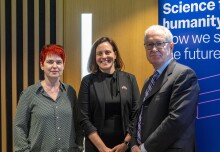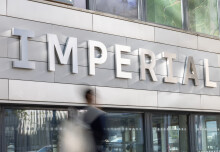

Imperial's Faculty of Engineering signs agreement to tackle climate change <em>- Joint Press Release</em>
See also...
Imperial College London joint news release
For Immediate Release
Monday 9 June 2008
At a ceremony at Imperial College London, Qatar’s Deputy Premier and Minister of Energy and Industry, His Excellency Abdullah Bin Hamad Al-Attiyah, Ms. Linda Cook, Executive Director of Royal Dutch Shell plc, Dr Tidu Maini, Executive Chairman of Qatar Science & Technology Park (QSTP), and Sir Roy Anderson, Rector Elect of Imperial College London launched a joint research collaboration that will focus on further understanding carbonate reservoirs, which constitute the vast majority of hydrocarbon reservoirs across the Middle East, and CO2 storage.
Funded jointly by Qatar Petroleum, the Qatar Science & Technology Park, and Shell, who will contribute together up to US$70 million over a 10-year period, this collaboration aims to provide the foundation for new CO2storage technologies that can be applied in Qatar, elsewhere in the Middle East and beyond.
This collaboration forms part of a technology partnership between Qatar Petroleum and Shell, within the Qatar Science & Technology Park, that involves select academic partners from around the world, the first of which being Imperial College. It also builds on the on-going Grand Challenge Programme agreed between Shell and Imperial in 2006.
The agreement will see Imperial’s Departments of Chemical Engineering, and Earth Science and Engineering recruit a number of new academic staff, 20 PhD students and 20 postdoctoral researchers to push forward research in the UK and in Qatar. It will also provide critical expertise for Qatar and Shell as they seek to develop hydrocarbon resources in a sustainable way.

Researchers involved in this collaboration will characterise carbonate reservoirs in detail and develop advanced computer modelling and simulations to establish an in-depth knowledge of rock structures and the way fluids like oil, water, and natural gas and CO2 move within them. This in turn will improve understanding of how these rocks trap gas and fluids.
With this knowledge, researchers will be able to propose new CO2 management plans and processes, and identify suitable carbonate rock formations to potentially store CO2 emitted from power stations, oil refineries and other manufacturing plants.
H.E. Minister Al-Attiyah stated, “I am delighted to be in London at the launch of one of the most ambitious and important research collaborations in the field of CO2 management to date. This collaboration represents a remarkable step forward in the realization of the wise directives of His Highness Sheikh Hamad Bin Khalifa Al- Thani, the Emir of Qatar, to focus on scientific research through technology partnerships with the world’s leading players in academia and industry. I would also like to express our sincere gratitude to Her Highness Sheikha Mozah Bint Nasser Al-Missned, who is a driving force in Qatar’s quest for excellence in education and scientific research.”
H.E. Minister Al-Attiyah further remarked, “As a major resource holder in a time of rising demand for oil and gas, Qatar is keenly aware of the need to balance the energy security concerns of our customers with the need to preserve the environment. My country is committed to the development and implementation of technologies that will allow us to take on this challenge in an effective and responsible manner and is proud to have Shell and Imperial College London as partners in this quest.”
Sir Richard Sykes said, “This is an exciting long-term partnership which aims to tackle one of the major challenges facing the world - securing sustainable sources of energy in a way that does not exacerbate climate damage. One of the beauties of collaboration is that we can achieve far more together than would be possible individually, so I am delighted that Imperial has Qatar Petroleum, Qatar Science & Technology Park and Shell as its partners for this vital endeavour.”
Ms. Linda Cook added, “Shell is pleased to work with our partners Qatar Petroleum, the Qatar Science & Technology Park and Imperial College London on the development of new technologies around CO2 management. The challenge we face is how to meet the world’s growing energy demand while at the same time managing the CO2 footprint of this growth. Through the initiative we launch today, I am confident we will be able to develop innovative and practical solutions for one of today’s most pressing environmental issues.”
Dr. Tidu Maini said, “It is vitally important to Qatar that the know-how for managing our petroleum reservoirs resides within the country. This is a responsibility you can’t delegate to others. The partnership we embark on today will ensure that cutting-edge petroleum technology is produced and transferred to Qatar – a great step forward for our knowledge-based economy.”
-ENDS-
For further information please contact:
Colin Smith
Press Officer
Imperial College London
Email: cd.smith@imperial.ac.ukTel: +44 (0)207 594 6712
Out of hours duty press officer: +44 (0)7803 886 248
Carlos Ibarguen
Communications Manager
Qatar Shell
Email: carlos.Ibarguen@shell.comTel: +974 4957789
Notes to editors:
1. About carbonate reservoirs
The vast majority of oil and gas reserves in the Middle-East are contained in carbonate reservoirs. Currently, only 10-40% of oil from carbonate reserves is recovered. These reservoirs consist of fractured and porous calcium carbonate rock which stores oil and gas inside the rock, making it difficult for engineers to recover the maximum amount of oil. The rock’s complex structure also makes it challenging to use depleted carbonate reservoirs for CO2 storage. Scientists believe improving their understanding of these carbonate reservoirs will enable them to develop new techniques for CO2 storage and improve methods for extracting oil and gas.
2. About Qatar Petroleum
Qatar Petroleum (QP), formerly Qatar General Petroleum Corporation, is a state-owned corporation established in 1974 responsible for all phases of the oil and gas industry in Qatar. The princ ipal activities of Q P and its subsidiaries and joint ventures cover exploration, drilling and p roduction operations, transport, storage, marketing and sale of crude oil, natural gas liquids, liquefied natural gas, gas to liquid s, refined products, petrochemicals and fertilizers. In addition to its operations, QP carries out its activities through its various subsidiaries and joint ventures such as Qatargas, RasGas, Industries Qatar, Qatar Petroleum International, QVC, Q-Chem and others. Website: www.qp.com.qa
3. About the Qatar Science and Technology Park
Qatar Science & Technology Park fosters the development and commercialisation of technology in Qatar, a rising star in the Arabian Gulf with the world’s th ird larg est gas reserves and a remarkable vision for human development. As part of the renowned Qatar Foundation, founded by the c ountry’s Emir, the science park is co-located with campuses of Carnegie Mellon, Texas A&M, Weill Cornell and other premier universities. It provides research-friendly premises for companies from around the world, plus an incubator and investment for technology start-ups. Already EADS, ExxonMobil, GE, Microsoft, Rolls- Royce, Shell and Total have joined Qatar Science & Technology Park, and its first phase of buildings opens mid 2008. Website: www.qstp.org.qa
4. About Imperial College London
Imperial College London - rated the world's fifth best university in the 2007 Times Higher Education Supplement University Rankings - is a science-based institution with a reputation for excellence in teaching and research that attracts 12,000 students and 6,000 staff of the highest international quality. Innovative research at the College explores the interface between science, medicine, engineering and business, delivering practical solutions that improve quality of life and the environment - underpinned by a dynamic enterprise culture. Website: www.imperial.ac.uk
5. About Shell
The Shell Group of companies is a global group of energy and petrochemical companies with operations in 110 countries and territories. Shell businesses include oil and gas exploration and production; production and marketing of liquefied natural gas and gas to liquids; manufacturing, marketing, trading and shipping of oil products, chemicals and renewable energy projects. Shell is at the forefront of energy trading and is one of the largest traders of crude oil and refined products. Website: www.shell.com
Article text (excluding photos or graphics) available under an Attribution-NonCommercial-ShareAlike Creative Commons license.
Photos and graphics subject to third party copyright used with permission or © Imperial College London.





